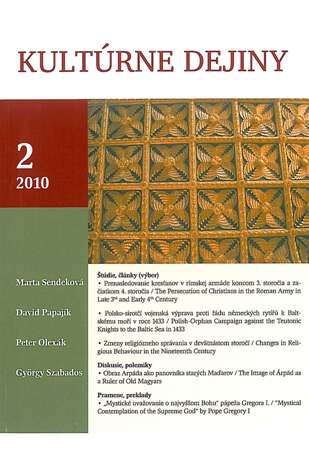Prenasledovanie kresťanov v rímskej armáde koncom 3. storočia a začiatkom 4. storočia
The Persecution of Christians in the Roman Army in Late 3rd and Early 4th Century
Author(s): Marta SendekováSubject(s): History
Published by: VERBUM - vydavateľstvo Katolíckej univerzity v Ružomberku
Keywords: Roman Empire; Diocletian; Tetrarchy; Persecution of Christians; Roman military; Acta; Passiones
Summary/Abstract: The beginning of the Christians´persecution under the reign of Emperor Diocletian (284 − 305) and during the first tetrarchy is dated back to the 90´s of the 3rd century in the Roman Empire. After founding the tetrarchic collegium the emperor focused on a large package of reforms in respective areas of political life in the Empire. The religious policy of Diocletian aimed at the renewal of the traditional Roman religion and laying theocratic foundations for the imperial power. A close relationship between the pagan religion and Empire’s idelology brought about necessarily a conflict with Christianity. The imperial edict ordering the purge of Christians from the army has recently become a matter for discussion. This pertains to facts about when the edict was issued and which emperor was accountable for it. Based on works of ancient authors Eusebius and Lactantius one can assert that the edict was formally and definitely originated by Diocletian and it was issued by him probably in 297/298. The publication of the edict brought about a problem incurring the incompatibility of the Christian religion with a soldier’s profession and his remaining in the service of emperors. The edict included the order for soldiers to quit the service should they not subject themselves to the Pagan worship, being obligatory for them. The Christian sources of acta and passiones offer individual cases of the purge of Christians from the army. For instance, a legend on the Theban Legion refers to the execution of Christian soldiers as a consequence of the program’s “cleansing” in the army. Acta Maximiliani records the death of soldier Maximilian who refused to enter the army because it contradicted his religious belief. Passio S. Marcelli reports on a severe transgression of the refusal of obedience of higher officer Marcellus who refused to serve in the army because of his belief. A similar case represents veteranus Tipasius who refused the military service on African soil, described in Passio S. Typasii Veterani. As any confrontation of these files with other ancient documents is not possible it is also not possible to claim unequivocally what is credible and what a legend in the sources. This is why it is essential to consider the historical core of the sources with caution. These documents are to be read as an evidence on the legacy of the Christian belief and religious worship. To sum up, one can assign a character of a limited his-torical value to them and have them in the hagiographic tradition attached.
Journal: Kultúrne dejiny
- Issue Year: 2010
- Issue No: 2
- Page Range: 175-185
- Page Count: 11
- Language: Slovak

